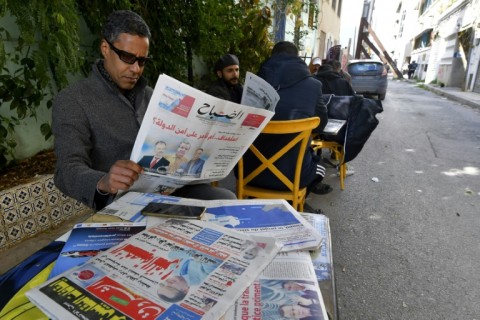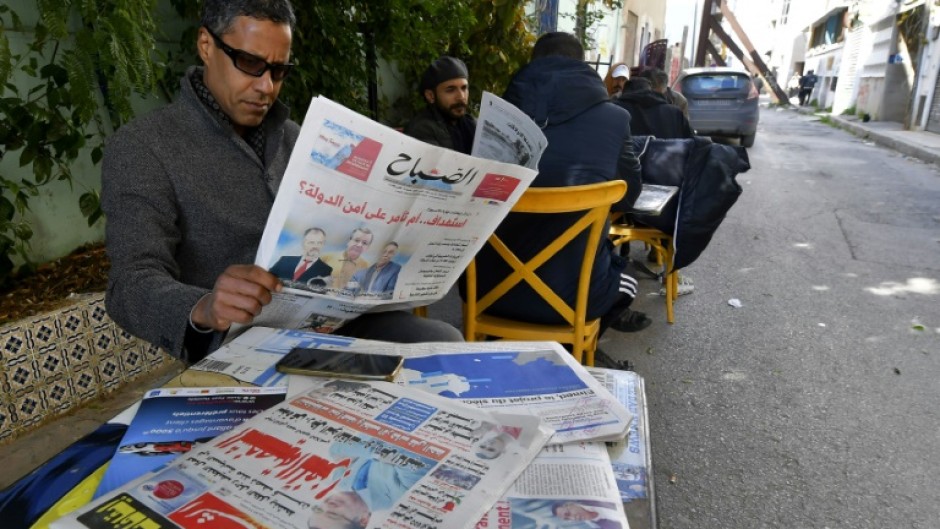
TUNIS - A wave of arrests by Tunisian security forces has sparked fears that President Kais Saied is resorting to tougher measures against his opponents in the crisis-hit birthplace of the 2011 Arab uprisings.
The latest arrests, including senior figures in the Islamist-inspired Ennahdha party, come a year and a half after Saied sacked the government, froze parliament and seized far-reaching powers in what his rivals have described as a coup.
While a number of Saied's opponents have since been questioned or placed on trial in military courts, the arrests since Saturday of the head of the country's most popular radio station and a prominent businessman, along with several other public figures, appear to mark an escalation.
"The country is facing a grave crisis," said political analyst Abdellatif Hannachi, saying the circumstances around the arrests were "very murky".
"The president has become obsessed with using the security forces," Hannachi added.
Saied has forced through sweeping changes to the fragile democracy that emerged from Tunisia's 2011 uprising, pushing through a new constitution and installing a toothless parliament in votes that saw unprecedentedly low turnout.
Tunisians are meanwhile grappling with a ruinous economic crisis that has seen essentials like cooking oil and coffee disappear from the shelves.
Police on Monday night arrested former justice minister Noureddine Bhiri and Mosaique FM director Noureddine Boutar, two days after the detention of tycoon Kamel Eltaief, former top Ennahdha figure Abdelhamid Jelassi and political activist Khayam Turki.
Lawyer and former minister for state property Ghazi Chouachi said authorities were trying to "distract public attention and intimidate the opposition".
In a Facebook post, he said the arrests were "arbitrary" and that Saied's rule was one of "permanent absurdity".
'Intimidation and arbitrary detention'
UN rights chief Volker Turk also voiced alarm on Tuesday over "the deepening crackdown against perceived political opponents and civil society in Tunisia, including attacks on the independence of the judiciary", his spokesman Jeremy Laurence told reporters in Geneva.
The charges against those detained have not been made public, but Saied said on Tuesday that some of those arrested were "criminals who were plotting against state security".
He also blamed them for shortages of consumer goods and runaway inflation, which experts have attributed to the fallout from the war in Ukraine and the struggles of the Tunisian dinar.
"Organised gangs are plotting with these traitors and mercenaries," Saied told his trade minister in a video posted on the presidency's Facebook page.
"Conspiracy against state security" can carry the death penalty.
Ennadha issued a statement saying it "strongly condemns the abductions and systematic abuse of the opposition by Kais Saied's putschist authorities".
Mosaique also said that it "strongly condemns the intimidation and arbitrary detention" of its director and what it called the state's "campaign of fear" against journalists.
Media rights group RSF said on Twitter that Boutar's detention, "without an arrest warrant or official reason, his interrogation which focused on his editorial choices, is as unacceptable as it is sadly revealing of the crackdown on the press in #Tunisia".
Those arrested also include a senior official from the UGTT trade union federation, one of the country's most powerful political forces which has had an increasingly tense relationship with Saied.
Last week, 66 civil society groups, parties and political figures voiced their "full support" for the powerful UGTT trade union, accusing Saied of "targeting" it and trying to "criminalise union work".
The top UGTT official for highway workers, Anis Kaabi, had been arrested on January 31 after a strike by toll barrier workers, in what the union has described as "a blow to union work and a violation of union rights".

